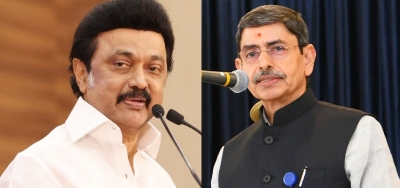Chennai: The simmering tension between Governor R.N. Ravi and the Stalin-led DMK alliance government in Tamil Nadu finally spilled out onto the Assembly floor at the start of the year’s first session. A miffed governor walked out even as the ruling party and its allies moved a resolution to have only the government-approved version of the speech, ‘on record’.
Earlier, in his customary address to the legislative assembly that is drafted by the state government, the governor had omitted references to the Dravidian model of governance, and the law and order situation in the state.
Predictably, the governor’s ‘walkout’ was criticised by the ruling party and its allies, who include the Congress party. A couple of days later, a high-level DMK delegation called on the President to seek recall of the governor.
The latest flashpoint between the governor and the state government is indicative of the confrontational nature of Centre-state relations in south India in general, and Tamil Nadu in particular.
With four of the five states in south India ruled by non-BJP parties, the Centre-state friction is more pronounced in this part of the country. Tensions between the governor and government, have been simmering in three states — Telangana, Kerala, and Tamil Nadu.
In Tamil Nadu, tensions have steadily increased after the DMK stormed into power in May 2021, after spending ten years in the opposition benches. A few months later, when RN Ravi took over as Tamil Nadu governor September 18, 2021, eyebrows were raised in local political circles over the appointment of a former top cop and Naga peace talks interlocutor.
To begin with, it appeared that relations were cordial. However, with the governor not giving his assent to several legislations passed by the assembly, the DMK began getting restive. It was only after the assembly unanimously passed the NEET exemption Bill twice, that the governor sent it to the President for approval. During their meeting with President Murmu last week, the DMK delegation had complained that as many as 20 Bills are pending with Ravi.
The Coimbatore bomb blast case in October turned into another flashpoint with RN Ravi questioning the state government’s initial dithering on handing over the case to the NIA and finally doing so four days later.
However, matters further deteriorated early this year, when the governor in an interaction with the Kashi Tamil Sangamam, opined that the word ‘Tamizhagam’ or ‘Home of Tamils’ is more appropriate than ‘Tamil Nadu’ or ‘Tamil Country’ for the state. The message being that the name ‘Tamil Nadu’ emphasises a distinctness from the rest of India.
DMK leaders frequently express the opinion that the governor is turning out to be an instrument for the central government to meddle in state affairs.
Further controversy arose when the official invitation to Pongal festivities at the governor’s residence, was sent out to invitees early this year. Instead of the ‘temple gopuram’ which is the official Tamil Nadu state emblem, the governor’s invitation sported the government of India’s emblem. It also addressed the governor as “Tamizhaga Aalunar” (Governor) instead of the standard “Tamil Nadu Aalunar.”
All these developments over the past two years culminating in the episode at the Assembly session, imply a point of no return for Centre-state relations in Tamil Nadu.
Despite very low traction in the ‘Dravidian state’ the ruling BJP at the Centre is making all out efforts to create a space for itself in Tamil Nadu. The Tamil Nadu unit of the BJP, led by an aggressive Annamalai, himself a former IPS officer, has been rooting for the governor and his every move.
With the 2024 parliamentary polls set to be the next electoral battle in Tamil Nadu, the next two years may see further acrimony between the governor and the state government.
A political analyst observed that this state of affairs could benefit both, the DMK as well as the BJP to cross swords without actually resorting to an all-out war.
-IANS







































